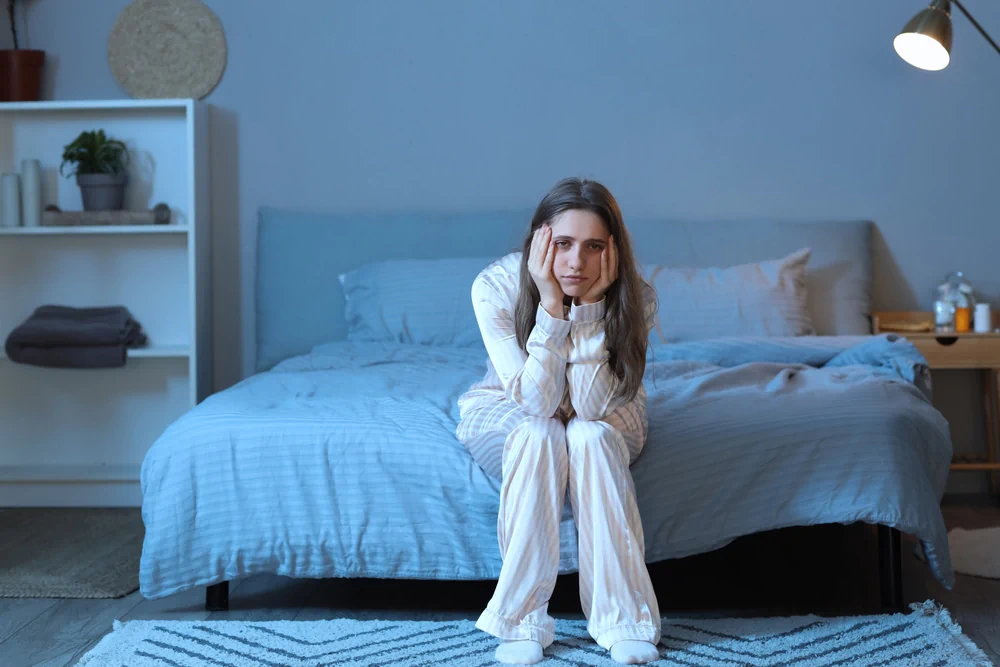Do you find it more difficult to sleep in the winter? If so, you may be experiencing winter insomnia. Winter insomnia is similar to regular insomnia, during which you experience difficulty falling asleep, staying asleep, and grogginess throughout the day; the only difference is that winter insomnia, because of its seasonality, isn’t a medical diagnosis, and may stem from other health issues or disorders.
So, what is the issue with struggling to sleep in the winter? While many sleepers shrug off the possibility of having any form of insomnia, winter insomnia can be particularly problematic as wintertime is typically a busy season. With major holidays trailing one right after the other, it’s tough to feel in the spirit when you’re exhausted.
Luckily, winter insomnia can often be easily treated with a number of tips — and the right mattress.
Do we need more sleep in winter?
Research suggests that humans require more and deeper sleep in the wintertime than we do in other seasons. Think about it: mammals, amphibians, and other animal species get to take the whole season off to hibernate — we humans, especially here in Texas, are forced to face the colder temperatures and shorter days head-on. And while it doesn’t get particularly freezing here in the Lone Star State (except for that one time), our southern bones aren’t built to brace the cold for too long.
To keep ourselves healthy and strong, we need to get proper sleep each night. But those who struggle with insomnia, especially during the winter months, are constantly battling with themselves to have a peaceful night.
How long does it take for someone to fall asleep? You should be able to fall asleep within 10-15 minutes of lying down, but insomniacs might take 30 minutes or longer to finally drift off to sleep. Less sleep causes a domino effect of mental and physical health issues that make life harder every day.
What causes seasonal insomnia?
Winter insomnia, also known as seasonal insomnia, is influenced by several factors that make falling and staying asleep more difficult. Some of these factors include:
Seasonal affective disorder (SAD)
SAD is a type of depression that lasts throughout the same seasonal patterns each year. Most people experience seasonal depression during fall and winter because there is less sunlight — and reduced sunlight exposure causes dips in serotonin and melatonin levels in the brain that regulates your sleep cycle, causing seasonal insomnia. This can also cause some individuals to oversleep (hypersomnia).
Seasonal affective disorder usually lasts around 4-5 months, with symptoms becoming more manageable as the spring season rolls around and the days get longer. If you believe that you are affected by seasonal depression disorder, speak to a professional to pinpoint which route of treatment is best for you.
Keep reading: Is oversleeping bad?
Increased stress
While the holiday season is portrayed as a very joyous time of year, it’s no secret that its demands can make even the jolliest individual stressed out. The stress of social obligations, traveling, family gatherings, presents to purchase, and food to make can lead you to feel overly stressed and burnt out.
The effects of stress on sleep can be pretty severe for your sleep quality. When you’re stressed, your cortisol levels increase, which is meant to give you more energy to handle the tense task, and then melatonin will swoop in to help calm you down to get a good night’s sleep. Well, too much stress tells your brain that you need to stay alert and can result in insomnia. Combatting stress-induced winter insomnia will require you to prioritize relaxation and delegating your many tasks.
Holiday eating habits
The most wonderful time of year also brings some of the most wonderful food we eat all year — but we have to admit that it’s not always the healthiest. Many of us feel tired after eating a large holiday meal because the foods are typically high in sugar and fat and cause blood sugar spikes that result in fatigue.
That after-meal nap you feel compelled to take after your second plate will throw your sleep schedule off-balance, making it hard for you to fall asleep at night. Not to mention that heavy, late-night meals can lead to discomfort and sleep disruptions throughout the night.
Less exercise
Speaking of unhealthy holiday habits, it’s not uncommon for anyone to skip their weekly workouts during the busy holiday season. But what some of you may not realize is that working out and sleeping go hand-in-hand to provide restful sleep. Regular exercise promotes better sleep by reducing stress and regulating your sleep cycle. If you skip your workouts, you may notice that it is more difficult for you to fall asleep.
Consistent traveling
Whether you’re flying to visit family or packing the kids in the car for a road trip, if you can’t sleep when traveling, you’ll have a hard time getting the rest you need this winter. Traveling stress, uncomfortable guest beds, and late-night parties can all throw your sleep schedule off. If you know you’ll be on the road or in the air this season, try your best to reduce stress and prioritize relaxation to combat insomnia.
How do you fix winter insomnia?
Our expert tip for how to get more sleep in the wintertime is to invest in the best mattress for your needs. Sleeping on a bad mattress can cause unnecessary discomfort, leading to restless nights and even more frequent awakenings. If you want to address your winter insomnia, invest in the right mattress.
While there is not one best mattress for insomnia, a quality mattress that supports your body’s natural spinal alignment can improve comfort, reduce tension, and encourage deeper sleep cycles to help you sleep well each night. If the idea of mattress shopping stresses you out, then try Texas Mattress Makers. Our online and in-person shopping experience is designed to make finding your perfect mattress easier and more affordable.

Make Mattress Shopping Easier
Aside from purchasing a top-quality mattress, here are some other tips for treating winter insomnia:
- Exercise regularly for a minimum of 20 minutes
- Soak in the sunlight soon after waking up
- Limit naps to 10 – 20 minutes
- Invest in a SAD lamp for light therapy
- Keep your home around 65 – 68° during the night
- Prioritize relaxation before bedtime
- Stick to a consistent sleep schedule
- Seek medical help from a psychologist or sleep specialist
Don’t Let Winter Insomnia Ruin Your Holidays
Getting quality sleep in the winter and every other season is incredibly important, and you cannot get a good night’s rest without a proper mattress. If you need a new mattress, you should highly consider shopping with Texas Mattress Makers.
Unlike other mattress stores in Houston, we make all of our mattresses in our on-site factory in Downtown Houston. Buying directly from the manufacturer allows you to save money while receiving a top-quality product.
We understand that the holidays can be full of stressful shopping — but you won’t have to worry about that with us. Visit any of our Houston-area mattress stores and shop alongside an expert who can help you find your best mattress match in no time.
You deserve only the best of the best, and we guarantee that you won’t find a better quality mattress for a better price. Our gift to you is the gift of better sleep.
More Helpful Articles by Texas Mattress Makers:
- How Much Sleep Do I Really Need?
- Tips for What To Do If You Can’t Fall Asleep
- Why You Shouldn’t Invest in a Smart Mattress
- Pros and Cons of Taking Melatonin for Sleep
- 5 Unexpected Benefits of Sleep
